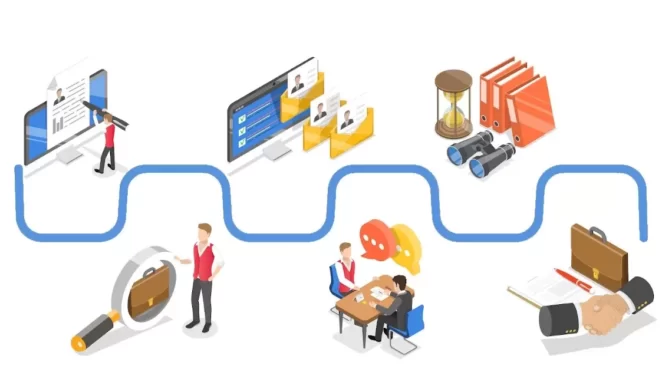
Talent recruitment is a fundamental pillar for the growth and success of any organization. However, for a long time, this process has been a laborious and time-consuming task, requiring a significant investment of resources and time. Fortunately, technological advancements have disrupted this field, drastically changing the landscape. Nowadays, there is a wide range of technological tools and platforms that not only simplify and expedite the recruitment process but also elevate the quality of hires and provide a more gratifying experience for both candidates and recruiters.
You might be interested in the following article: “Recruitment 4.0.”
The role of technology in recruitment has demonstrated multiple significant benefits. Firstly, it has enabled greater efficiency and speed in the process. Companies can now access a broader audience of candidates in a short period, reducing hiring times and preventing unnecessary job vacancies from remaining unfilled.
In addition to effectiveness, technology has improved the accuracy in candidate selection. Thanks to algorithms and artificial intelligence, it is possible to conduct a more comprehensive and objective analysis of candidates’ skills, experience, and cultural compatibility. This reduces the possibility of bias and errors in selection, resulting in a more diverse and inclusive workforce.
Another key benefit of technology in recruitment is the transformation of the candidate experience. Modern platforms allow applicants to apply quickly and easily, providing them with detailed information about the company and the vacant position. This attention to detail creates a positive impression of the company and enhances the perception of its employer brand.
Within the vast array of technological recruitment tools and platforms, some stand out for their effectiveness and functionality, including:
1. Applicant Tracking Systems (ATS): These programs are designed to manage the flow of candidates throughout the recruitment process. ATS allows recruiters to organize and track job applications, resumes, and communications with candidates. Some ATS even offer data analytics functionalities and integration with social networks and job sites.
2. Online Job Platforms: These are web portals where companies can post their job openings, and candidates can apply. Some of these platforms use algorithms to display relevant job offers to candidates and recommend suitable profiles to recruiters, optimizing the matching process between job openings and applicants.
3. Virtual Interviews: Virtual interviews have become increasingly popular, especially in the context of remote work. Tools like Skype, Zoom, or Microsoft Teams allow recruiters to conduct online interviews with candidates located anywhere in the world, resulting in significant time and travel cost savings.
You may be interested in the following article: ‘How to Conduct an Effective Selection Interview to Find the Best Talent.‘
4. Online Skills Assessment: To evaluate candidates’ technical skills and competencies, online skill assessment platforms offer tests and evaluations. These tests are particularly valuable for identifying the best candidates for specific roles, such as software developers or data analysts.
You may be interested in the following article: ‘Why are online psychometric tests important?‘
5. Predictive Analysis and Artificial Intelligence Tools: The implementation of predictive analysis and AI tools has become a growing trend. Some companies use machine learning algorithms to predict which candidates are most likely to succeed in the job position. These algorithms analyze historical hiring and performance data to identify patterns and common characteristics among successful employees.
6. Social Media Analysis: Social media analysis has also gained ground in the recruitment process. Platforms like LinkedIn provide recruiters with a wealth of data about potential candidates, such as their work experience, skills, and colleague recommendations. Social media analysis can also help companies better understand a candidate’s professional reputation and profile.
You may be interested in the following article: ‘5 Tips to Find the Best Candidates on LinkedIn.‘
On the other hand, while still in its early stages, Virtual Reality and Augmented Reality are beginning to be used in recruitment to provide candidates with more immersive and realistic experiences of the company’s culture and work environment, enabling them to make more informed decisions about their interest in the company.
In conclusion, technology has revolutionized the recruitment process in multiple aspects. From the emergence of the first applicant tracking systems to the widespread use of artificial intelligence algorithms, technology has proven to be a powerful ally in simplifying and improving this process. The technological tools and platforms mentioned in this article are just a sample of what is available in the current market. It is expected that ongoing technological advancements will lead to new innovations that will continue to transform recruitment in the future.
However, it is essential to bear in mind that, despite the contribution of technology, human decision-making skills should not be underestimated. Recruiters should use these tools as support, always applying their judgment and experience to make strategic and informed decisions during the selection process.
Ultimately, the goal of recruitment remains the same: to find and attract the right talent to fill job positions and ensure that the company has a competent and diverse workforce that drives its success. Technology simply provides new and exciting ways to achieve this goal, improving efficiency, accuracy, and the candidate experience throughout the process.
